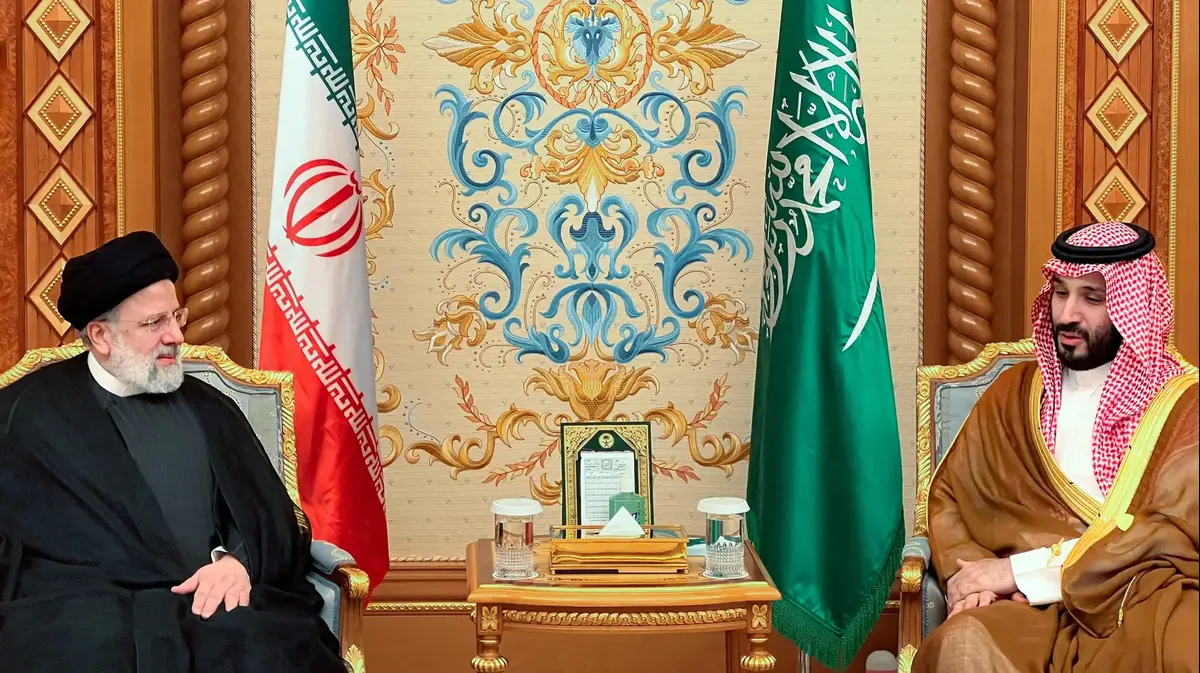Video: Historic handshake between the Iranian president and Saudi crown prince/according to Article 27A
Many harsh words were spilled in speeches at the summit of Arab and Muslim countries held today (Saturday) in Riyadh. One by one, the leaders condemned Israel and called for a ceasefire. The summit's concluding statement was also harsh. However, there was one thing in it – a call to stop, even symbolically, the normalization process with Israel.
Saudi Arabia's Crown Prince Mohammed bin Salman and Iranian President Ebrahim Raisi at a summit in Riyadh, November 11, 2023/Reuters
Why it's important
- One of the most significant photos at this summit was of Iranian President Ebrahim Raisi arriving at the palace in Riyadh and being received by Saudi Crown Prince Mohammed bin Salman, who shook his hand in front of the cameras. This kind of encounter hasn't happened in many years. But between handshakes and smiles for the cameras, and meaningful policy agreements, there is a big gap.
- Raisi arrived at the summit in Riyadh in an attempt to push for a resolution that would symbolize a halt to the normalization process between the Arab and Muslim world and Israel. The Iranians hoped that they would be able to include a clause in the resolution about halting economic ties with Israel or about boycotts of one kind or another. They failed.
More in Walla!
The treatment that prolongs the lives of lung cancer patients
In association with the Israeli Lung Cancer Association
The big picture
- The decisions of the Arab summit showed that Mohammed bin Salman is sensitive to public opinion in the Arab and Muslim world. He made sure to take pictures with Palestinian Authority Chairman Mahmoud Abbas and say the right things about Gaza.
- However, he is also sensitive to what people in Washington and Jerusalem think. He called for the release of the abductees and did not express support for Hamas. In general, anyone who has followed the Saudi media since the beginning of the war easily identifies a clear anti-Hamas line. This is not by chance.
- Although Mohammed bin Salman is not closing the door to normalization with Israel, he understands much more that the Palestinian component of any future agreement will have to be much more significant. It is no coincidence that the summit's concluding statement this evening emphasized that any regional peace process must include a solution to the Palestinian issue.
In the News Hub
- At the same time as the summit in Riyadh, Hezbollah Secretary-General Hassan Nasrallah gave another speech from the bunker in Beirut. Nasrallah was careful not to threaten, stressed that "the area will talk," boasted about launching Hezbollah drones into Israeli territory, and noted that the war would be long.
- It is impossible to know what Nasrallah's next step will be, but at the moment it seems that he is in no hurry to escalate the war on the northern border. In his speech, he referred to the front in Lebanon, Syria and Yemen as a means of pressure from the resistance axes, which make it difficult for Israel to conduct the fighting in Gaza.
- Hezbollah's secretary general was particularly proud of Houthi missile launches from Yemen. Hezbollah trained the Houthis for many years during their war against Saudi Arabia. Nasrallah did not mention the Saudis by name, but expressed regret that there were Arab countries that intercepted missiles and drones launched by the Houthis at Israel.
- Nasrallah stressed that time was on Hamas' side and against Israel, and that with each passing day more and more countries were calling for a ceasefire. He tried to mobilize the public in the Arab world to pressure its leaders to pressure the United States to order Israel to stop the war in Gaza.
- French President Macron's remarks over the weekend showed that international criticism of Israel is growing, but Prime Minister Netanyahu and his advisers believe that the pressure for a ceasefire is not heavy at all. At this stage, the White House is not demanding a ceasefire, and support for continued fighting in the US Congress is also still high.
- As long as this is the case, the fighting is likely to continue. Only a deal to release hostages seems like something that can bring the fighting to a halt – even if only temporarily. U.S. and Israeli officials say that despite continued talks between the United States, Qatar, Hamas and Israel, no deal is around the corner.
A point to think about
- The person who starred in the speeches of some of the leaders at the Riyadh summit was Heritage Minister Amichai Eliyahu. Iranian President Raisi and Turkish President Erdogan used his statement in favor of dropping an atomic bomb on Gaza to call for international oversight of Israel's military nuclear program. According to them, its existence was confirmed by an Israeli government minister, who still serves in his position.
- The Arab summit's resolution included a call on the international community to impose a ban on arms sales to Israel as long as the war in Gaza continues. This clause will not prevent Arab countries, led by Saudi Arabia, from continuing to buy weapons from Israel in order to defend themselves against Iran and its proxies in the region.
- More on the subject:
- Saudi Arabia
- Iran
- Iron Sword War
- Gaza War

